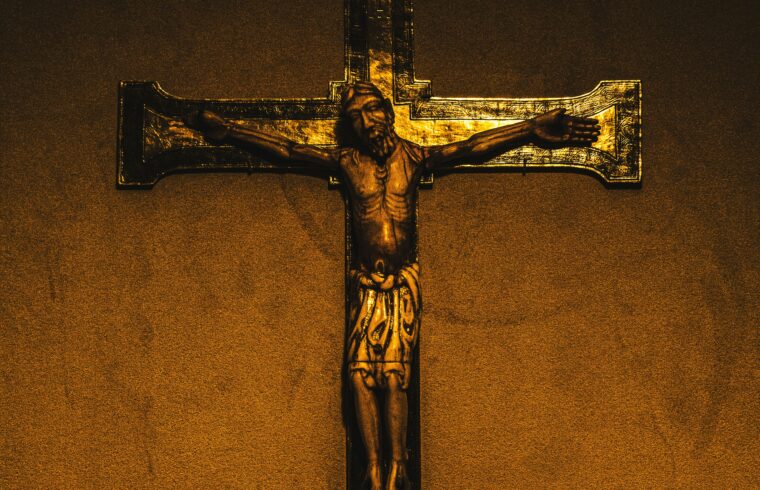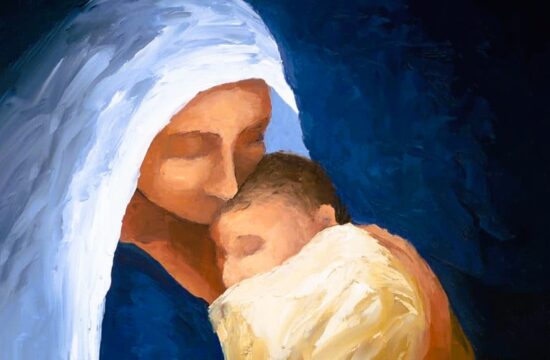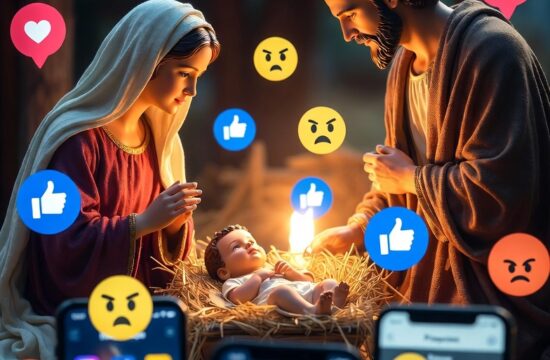We’re in danger today…
I don’t mean physical danger like our brothers and sisters in Nigeria where just yesterday 303 Catholic school children were kidnaped by Islamic Terrorists in their ongoing attempt to eliminate any trace of Christians and Christianity.
Thankfully, (for now) we’re not in that type of danger.
But we are in real danger.
Spiritual danger.
The danger of forgetting who rules our lives.
The danger of letting the noise of the world drown out the voice of God.
The danger of letting headlines, algorithms, and arguments tell us who we are.
Because in this age of hyper-polarization—where every scroll demands your outrage, every opinion demands your allegiance, and even family dinners can feel like a political minefield—we walk into church today and dare to celebrate one of the boldest feasts in the entire liturgical calendar:
The Solemnity of Our Lord Jesus Christ, King of the Universe.
Thank you for taking the time to read this homily for the SOLEMNITY OF OUR LORD JESUS CHRIST, KING OF THE UNIVERSE (November 23, 2025). Your support means a great deal to me, and I’m deeply grateful for the many who share these messages with their friends, families and social media followers. If you’ve found meaning in these words, I’d be grateful if you’d share them with others who might benefit.
And for those who prefer listening, you can find the audio version on SoundCloud HERE or subscribe to the podcast on iTunes HERE. Your comments, messages, and the way you’ve embraced these homilies continue to inspire me. Sincerely in Christ -Father Jim
Not “Jesus, inspirational speaker.”
Not “Jesus, spiritual consultant.”
Not “Jesus, helpful life coach.”
Jesus Christ, King of the Universe.
And suddenly… people flinch.
As if “Christ is King” is a political slogan.
As if some commentators, celebrities invented it to define the meaning of the claim.
As if the Church invented something edgy to stir the crowd.
But the more I prayed with this feast, the more I realized something crucial:
“Christ is King” has never been a safe phrase.
It has always been controversial.
Always been world-shaking.
Always been a dividing line.
Always demanded something life-changing from the people who say it.
And the Scriptures today walk us right into that tension.
The first reading comes from the Second book of Samuel, with a moment that looks triumphant from the outside. All the tribes of Israel gather around David, saying:
“Here we are, your bone and flesh.”
They anoint him king. They commit themselves to him.
It feels like a perfect coronation scene.
But if you know the backstory, the scene is shaking with tension.
Israel was never meant to have an earthly king.
They were meant to be different from the nations.
Set apart.
Guided directly by God.
But human nature hasn’t changed much.
We’re always tempted to want what everyone else has.
And the Israelites begged:
“Give us a king. Give us what’s normal. Give us someone to see, someone to follow, someone to fix things.”
God, in heartbreaking mercy, allowed it.
His love so secure, so perfect, He allows our free will –
even when it means we choose against His plan
choose against Him.
By the time we arrive at today’s reading, the consequences have been devastating:
- The once-united twelve tribes are fractured.
- Ten tribes have broken off entirely.
- The nation is exhausted by civil war.
- Trust has evaporated.
- Suspicion reigns.
And in that brokenness, the people turn to David.
A flawed man.
A complicated man.
A man who will lead them—but who will also fall painfully, publicly short.
David is a reminder written across every century of human history:
No human leader—no matter how promising—can save us.
No political system can heal the human heart.
No earthly king can be the King we truly need.
Israel learned that the hard way.
And if we’re honest… we often do too.
And then the Church does something stunning.
On a feast about kingship, sovereignty, and glory—
we are taken not to the empty tomb,
not to the Ascension,
not to a throne or a crown or a chorus of angels.
We’re taken to Calvary.
To a cross.
To humiliation, blood, splinters, jeering crowds, and suffocating pain.
To the place no one chooses—except God Himself.
There, above the dying body of Jesus, hangs a sign hammered in mockery:
“This is the King of the Jews.”
The rulers sneer.
The soldiers gamble.
One criminal hurls insults.
Another whispers a desperate, dying plea.
Everything about this scene screams failure.
But heaven sees something else.
Heaven sees a coronation.
The cross is Christ’s throne.
The thorns are His crown.
His blood is His royal robe.
His outstretched arms are a King opening His kingdom to the world.
Every other king sends subjects to die for him.
This King dies for His subjects.
Every earthly king shows power by domination.
This King shows power by sacrificial love.
Every earthly king rules from above.
This King rules by descending into the deepest suffering of the human condition.
He reigns not by force—
but by forgiveness.
Not by crushing His enemies—
but by dying for them.
Not by demanding loyalty—
but by offering Himself completely.
This is the paradox at the heart of our faith:
The Almighty God becomes the Crucified King.
Now… let’s step out of ancient Israel.
Let’s step off Golgotha.
Let’s step into your life.
Because the kingship of Christ means nothing
if it does not touch the actual joys and wounds we carry.
And this King is not distant.
He is not theoretical.
He is not a figure hiding in stained glass, chiseled marble or mosaic patterns.
He knows you.
Deeply.
Personally.
Intimately.
He knows what it feels like:
- to be misunderstood
- to feel alone
- to be exhausted beyond words
- to be betrayed
- to feel pressure pulling you in a dozen directions
- to worry about tomorrow
- to carry burdens you don’t talk about
- to face fears you hope no one sees
- to grieve losses the world doesn’t notice
Christ the King is the only King who has lived the human story from the inside.
If you’re young and anxious about your future—He knows.
If you’re raising a family and stretched thin—He knows.
If you’re older and carrying grief or uncertainty—He knows.
He doesn’t reign from a distance.
He reigns from the trenches of human experience.
And because He has been there,
He can be there with you… for you.
Think back to this Gospel we just heard.
It contains one of the most breathtaking moments in Scripture,
unfolds in a single sentence…
The good thief, crucified with Jesus, turns to Jesus and says,
“Remember me.”
That’s it.
Two words.
Not a perfect prayer.
Not a confession of every sin.
Not a life turned around.
Just two words that speak of absolute faith and trust:
“Remember me.”
And Jesus answers with the greatest promise ever spoken:
“Today you will be with me in Paradise.”
Don’t miss the radical nature of that line.
The thief has no good works to show.
No chance to repair his past.
No ability to prove anything.
All he has is trust.
And that’s enough for our great King of Mercy.
It means this:
No one is too late.
No one is too broken.
No one is too far gone.
No one is beyond the reach of the King who saves.
And now we arrive at the altar.
Where the King gives us not a symbol,
not a reminder,
but Himself.
His Body.
His Blood.
His Soul.
His Divinity.
His very life.
The Eucharist is the King’s pledge:
“I am with you.
In every fear.
In every joy.
In every weakness.
In every step.
All in—until the end of time.”
This is not sentiment.
This is covenant.
Every Mass is a royal banquet—a foretaste of the eternal kingdom where every wound is healed
and every tear wiped away.
So what does it actually look like—practically—to live under the reign of Christ the King in our world?
It means choosing a different way:
- To forgive when the world says cancel.
- To listen when the world says argue.
- To pray for enemies when the world says attack.
- To build bridges when the world says build walls.
- To seek mercy when the world says seek revenge.
- To love when the world says protect yourself.
None of this goes viral.
None of it gains followers.
But all of it builds the Kingdom.
Christ’s reign advances not through slogans,
but through saints—
ordinary people doing quiet, courageous acts of love.
Imagine if every person in this church left today with one single resolution:
“Christ will reign in how I treat the next person I meet.”
Imagine what God could do with that.
“Christ will reign in how I treat the next person I meet.”
Imagine the healing that would unleash.
“Christ will reign in how I treat the next person I meet.”
Imagine the unity it could spark.
“Christ will reign in how I treat the next person I meet.”
Imagine the witness it would offer.
“Christ will reign in how I treat the next person I meet.”
The kingdom would break into the world—in this parish, in our families, in our workplaces—one heart at a time.
In a world obsessed with crowns that crumble—
power that fades,
influence that evaporates,
leaders who rise and fall—
There is only one King whose reign is eternal.
One King whose throne was a cross.
One King whose crown was of thorns.
One King whose victory was love.
One King whose kingdom has no end.
May it be said of us—not just that we believed in Him—
but that we belonged to Him.
Christ is King.
Yesterday, today, and forever.
Amen.











